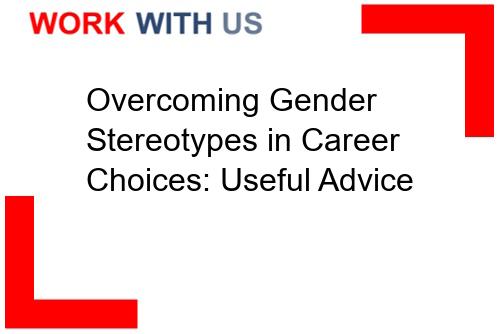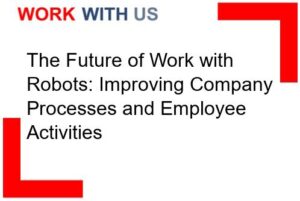Overcoming Gender Stereotypes in Career Choices: Useful Advice
In today’s society, gender stereotypes continue to influence individuals’ career choices, limiting their potential and perpetuating inequality. However, with the growing awareness of this issue, there is a collective effort to break free from these constraints and encourage individuals to pursue their passions, regardless of their gender. This article aims to provide useful advice on overcoming gender stereotypes in career choices, empowering individuals to follow their dreams and achieve their full potential.
Firstly, it is crucial to challenge societal expectations and preconceived notions about gender roles. From a young age, children are often exposed to stereotypes that associate certain careers with specific genders. Breaking free from these stereotypes requires questioning and challenging these assumptions. Parents, educators, and mentors play a vital role in encouraging children to explore a wide range of career options, regardless of their gender. By exposing children to diverse role models and providing them with equal opportunities to explore different fields, we can help them develop a broader perspective on career choices.
Secondly, it is essential to foster a supportive and inclusive environment that encourages individuals to pursue their interests. Schools and workplaces should actively promote gender equality and create an atmosphere where everyone feels valued and respected. This can be achieved by implementing policies that ensure equal opportunities for all, regardless of gender. Additionally, organizing workshops, seminars, and career fairs that showcase a diverse range of professions can help individuals explore various career paths and challenge gender stereotypes.
Furthermore, individuals should be encouraged to develop self-confidence and believe in their abilities. Often, gender stereotypes can lead to self-doubt and a lack of confidence in pursuing certain careers. Overcoming this requires building resilience and self-assurance. Encouraging individuals to participate in activities that boost their self-esteem, such as public speaking or leadership roles, can help them develop the confidence needed to pursue their desired career paths.
Additionally, it is crucial to provide access to resources and support networks that can guide individuals in their career choices. Mentorship programs, both formal and informal, can be invaluable in providing guidance and support. Connecting individuals with mentors who have successfully overcome gender stereotypes in their own careers can provide valuable insights and encouragement. Moreover, online platforms and communities dedicated to breaking gender stereotypes can serve as a source of inspiration and support for individuals facing challenges in their career choices.
Lastly, it is important to celebrate and highlight success stories of individuals who have defied gender stereotypes in their career paths. By showcasing these stories, we can inspire others to challenge societal expectations and pursue their passions. Media, both traditional and social, can play a significant role in amplifying these success stories and promoting a more inclusive narrative around career choices.
In conclusion, overcoming gender stereotypes in career choices requires a collective effort to challenge societal expectations, foster inclusive environments, build self-confidence, provide access to resources, and celebrate success stories. By empowering individuals to pursue their passions, regardless of their gender, we can create a more equitable society where everyone has the opportunity to thrive in their chosen careers.
Breaking the mold: empowering women to pursue male-dominated careers
In today’s rapidly evolving world, breaking the mold and empowering women to pursue male-dominated careers has become a crucial topic of discussion. The traditional gender roles that have long dictated career choices are gradually being challenged, as women strive to shatter glass ceilings and make their mark in fields previously dominated by men. This paradigm shift not only promotes gender equality but also fosters diversity and inclusivity in the workplace.
One of the key factors hindering women from venturing into male-dominated careers is societal expectations. From a young age, girls are often steered towards more “feminine” professions, while boys are encouraged to pursue careers in science, technology, engineering, and mathematics (STEM). However, it is essential to debunk these stereotypes and provide equal opportunities for women to explore their interests and talents in any field they desire.
To empower women in male-dominated careers, it is crucial to provide them with the necessary support and resources. Educational institutions and organizations can play a pivotal role in this regard by offering scholarships, mentorship programs, and workshops specifically tailored to encourage women to pursue non-traditional career paths. By equipping women with the knowledge and skills required for these careers, we can bridge the gender gap and create a more inclusive society.
Furthermore, it is imperative to challenge the biases and prejudices that exist within workplaces. Companies must actively promote diversity and inclusion by implementing policies that ensure equal pay, equal opportunities for career advancement, and a safe and respectful work environment for all employees. By fostering a culture that values and celebrates diversity, organizations can attract and retain talented women who can contribute significantly to their respective fields.
Role models also play a crucial role in empowering women to break the mold. Highlighting successful women who have excelled in male-dominated careers can inspire and motivate others to follow in their footsteps. By sharing their stories and experiences, these trailblazers can provide invaluable guidance and encouragement to aspiring women, showing them that their dreams are attainable and that they too can thrive in any profession they choose.
In addition to societal and workplace changes, it is essential to address the internal barriers that women may face when pursuing male-dominated careers. Self-doubt, imposter syndrome, and fear of failure are common obstacles that can hinder women from taking the leap. Encouraging women to develop self-confidence, resilience, and a growth mindset can help them overcome these challenges and pursue their passions with determination and conviction.
Breaking the mold and empowering women to pursue male-dominated careers is not only a matter of gender equality but also a means to drive innovation and progress. Research has consistently shown that diverse teams outperform homogeneous ones, bringing fresh perspectives and ideas to the table. By embracing diversity in all its forms, we can foster creativity, enhance problem-solving capabilities, and ultimately create a more inclusive and prosperous society.
In conclusion, breaking the mold and empowering women to pursue male-dominated careers is a multifaceted endeavor that requires collective effort from individuals, institutions, and society as a whole. By challenging stereotypes, providing support and resources, promoting diversity and inclusion, and fostering self-confidence, we can create a world where women have equal opportunities to thrive in any profession they choose. Embracing this change not only benefits women but also contributes to a more innovative, equitable, and prosperous future for all.
Challenging societal norms: encouraging men to explore non-traditional career paths
In today’s society, there is a growing recognition of the importance of challenging societal norms and breaking free from traditional gender roles. While progress has been made in encouraging women to pursue careers in male-dominated fields, there is still a need to address the issue of men exploring non-traditional career paths. Society often places expectations on men to pursue careers in fields such as engineering, finance, or technology, while discouraging them from pursuing careers in traditionally female-dominated fields like nursing, teaching, or social work. However, it is crucial to encourage men to explore these non-traditional career paths, as it not only promotes gender equality but also allows individuals to pursue their passions and talents without limitations.
Breaking the Stigma: Overcoming Gender Stereotypes
One of the main challenges in encouraging men to explore non-traditional career paths is the deeply ingrained gender stereotypes that exist in society. From a young age, boys are often conditioned to believe that certain careers are more suitable for them, while others are deemed feminine or less prestigious. This perpetuates the notion that men should be the breadwinners and occupy positions of power, while women should focus on nurturing and caregiving roles. To challenge these stereotypes, it is essential to promote gender-neutral education and provide young boys with exposure to a wide range of career options. By showcasing successful men in non-traditional fields and highlighting the positive impact they have made, society can gradually break down these stereotypes and encourage men to pursue their passions regardless of societal expectations.
Promoting Diversity and Inclusion in the Workplace
Encouraging men to explore non-traditional career paths also promotes diversity and inclusion in the workplace. When individuals from diverse backgrounds and experiences come together, it fosters creativity, innovation, and a broader range of perspectives. By breaking away from traditional gender roles, men can contribute their unique skills and perspectives to fields that have historically been dominated by women. This not only benefits the individuals themselves but also leads to a more inclusive and balanced workforce. Employers should actively promote diversity and inclusion by implementing policies that encourage men to explore non-traditional career paths, such as mentorship programs, flexible work arrangements, and unbiased hiring practices.
Challenging the Notion of Masculinity
Another important aspect of encouraging men to explore non-traditional career paths is challenging the notion of masculinity. Society often associates masculinity with strength, power, and dominance, which can create barriers for men who wish to pursue careers that are considered more nurturing or empathetic. By challenging these stereotypes, men can redefine what it means to be masculine and embrace careers that align with their passions and values. This shift in mindset not only benefits men but also contributes to a more inclusive and compassionate society.
Supporting Men in Non-Traditional Fields
To ensure the success and well-being of men in non-traditional career paths, it is crucial to provide them with the necessary support and resources. Men who choose to pursue careers in traditionally female-dominated fields may face unique challenges, such as bias, discrimination, or a lack of support networks. Employers and educational institutions should offer mentorship programs, networking opportunities, and support groups specifically tailored to men in non-traditional fields. Additionally, promoting work-life balance and addressing the stigma surrounding men in caregiving roles can help create a more supportive environment for men pursuing non-traditional careers.
The Benefits of Men Exploring Non-Traditional Career Paths
Encouraging men to explore non-traditional career paths brings numerous benefits to individuals, society, and the economy as a whole. Firstly, it promotes gender equality by challenging traditional gender roles and breaking down stereotypes. This allows individuals to pursue careers based on their interests and abilities rather than societal expectations. Secondly, it fosters diversity and inclusion in the workplace, leading to increased creativity, innovation, and productivity. By embracing a wider range of perspectives, organizations can better address the needs of diverse populations. Lastly, it contributes to a more balanced and equitable society, where individuals are free to pursue their passions and talents without limitations based on their gender.
In conclusion, challenging societal norms and encouraging men to explore non-traditional career paths is crucial for promoting gender equality, diversity, and inclusion. By breaking free from deeply ingrained gender stereotypes, supporting men in non-traditional fields, and redefining the notion of masculinity, society can create a more inclusive and equitable environment for all. Embracing diversity in career choices benefits individuals, organizations, and society as a whole, leading to a more balanced and prosperous future.
Navigating bias: strategies for overcoming gender stereotypes in the workplace
In today’s society, gender stereotypes continue to persist, even in the professional realm. These biases can hinder career growth and limit opportunities for individuals, particularly women, in the workplace. However, by implementing effective strategies, one can navigate these biases and create a more inclusive and equitable work environment.
First and foremost, education plays a crucial role in combating gender stereotypes. Organizations should invest in comprehensive training programs that raise awareness about unconscious biases and their impact on decision-making processes. By providing employees with the knowledge and tools to recognize and challenge these biases, organizations can foster a more inclusive workplace culture.
Another effective strategy is to promote diversity and inclusion at all levels of the organization. This can be achieved by implementing inclusive hiring practices, such as blind resume screening, to ensure that candidates are evaluated solely based on their qualifications and skills. Additionally, creating diverse interview panels can help mitigate biases and ensure a fair evaluation process.
Mentorship and sponsorship programs also play a significant role in overcoming gender stereotypes. Women often face unique challenges in the workplace, and having a mentor or sponsor who can provide guidance, support, and advocacy can be instrumental in their professional development. Organizations should establish formal mentorship programs and encourage senior leaders to actively sponsor and promote talented individuals, regardless of their gender.
Furthermore, it is essential to challenge and disrupt gendered language and behaviors in the workplace. Language shapes our perceptions and can reinforce stereotypes. Encouraging the use of inclusive language and avoiding gendered assumptions can help create a more inclusive environment. Additionally, organizations should discourage gendered behaviors, such as interrupting or dismissing women’s contributions, and promote equal participation and respect among all employees.
Transparency and accountability are also critical in combating gender stereotypes. Organizations should regularly assess their policies, practices, and decision-making processes to identify and address any biases. This can be done through conducting diversity audits, collecting and analyzing data on gender representation and pay gaps, and implementing corrective measures to ensure fairness and equality.
In order to foster a culture of inclusivity, it is important to provide opportunities for women to showcase their skills and expertise. Organizations should actively seek out and provide platforms for women to lead projects, present at conferences, and participate in decision-making processes. By amplifying women’s voices and recognizing their contributions, organizations can challenge gender stereotypes and promote gender equality.
Additionally, creating a supportive and flexible work environment is crucial in overcoming gender stereotypes. Offering flexible work arrangements, such as remote work options or flexible hours, can help alleviate the burden of work-life balance, which often disproportionately affects women. Moreover, organizations should provide parental leave policies that are inclusive and supportive of all genders, allowing individuals to balance their personal and professional responsibilities.
Lastly, fostering a culture of allyship is essential in overcoming gender stereotypes. Allies are individuals who actively support and advocate for marginalized groups. Organizations should encourage employees to be allies and provide resources and training on how to be effective allies. By creating a network of allies, individuals can collectively challenge biases and create a more inclusive and equitable workplace.
In conclusion, navigating bias and overcoming gender stereotypes in the workplace requires a multi-faceted approach. By investing in education, promoting diversity and inclusion, providing mentorship and sponsorship opportunities, challenging gendered language and behaviors, ensuring transparency and accountability, providing opportunities for women, creating a supportive work environment, and fostering a culture of allyship, organizations can create a workplace that is free from gender biases and empowers all employees to reach their full potential.
Parental influence and career choices: fostering gender-neutral upbringings for future professionals
Parental influence plays a crucial role in shaping a child’s career choices. From an early age, children observe and absorb the behaviors, values, and expectations of their parents, which can significantly impact their future professional aspirations. In recent years, there has been a growing emphasis on fostering gender-neutral upbringings to ensure that children are not limited by societal stereotypes and expectations. By promoting equality and providing diverse opportunities, parents can help their children develop a broader perspective on career choices and encourage them to pursue their passions without gender bias.
Breaking Stereotypes: Challenging Gender Norms
One of the key aspects of fostering a gender-neutral upbringing is challenging traditional gender norms. Parents can actively encourage their children to explore a wide range of interests and activities, regardless of their gender. For instance, instead of assuming that dolls are only for girls and cars are only for boys, parents can provide both options and let their children choose based on their preferences. By breaking down these stereotypes, children are more likely to develop a broader understanding of the world and feel empowered to pursue any career path they desire.
Encouraging Open Dialogue: Communication is Key
Open and honest communication between parents and children is essential in fostering a gender-neutral upbringing. Parents should create a safe space where their children feel comfortable discussing their interests, dreams, and concerns. By actively listening and engaging in conversations about various career options, parents can help their children explore their passions and guide them towards making informed decisions. It is crucial to avoid imposing any preconceived notions or biases on children and instead encourage them to think critically and independently about their future.
Leading by Example: Role Models Matter
Parents serve as the primary role models for their children. By demonstrating gender equality in their own careers and personal lives, parents can inspire their children to challenge societal norms and pursue their dreams without limitations. For instance, if a mother holds a high-ranking position in a traditionally male-dominated field, her daughter is more likely to believe that she can achieve the same level of success. Similarly, if a father actively participates in household chores and caregiving responsibilities, his son will learn that gender roles should not restrict his choices. These positive examples can have a lasting impact on children’s perceptions of gender and career possibilities.
Exposure to Diverse Career Paths: Broadening Horizons
Parents play a crucial role in exposing their children to a wide range of career paths. By providing opportunities to explore different professions, parents can help their children discover their interests and talents. This can be done through visits to workplaces, attending career fairs, or even engaging in discussions about various professions. It is important for parents to avoid steering their children towards traditionally gendered careers and instead encourage them to consider all options. By broadening their horizons, children are more likely to make informed decisions based on their own passions and abilities.
Supporting Personal Growth: Nurturing Confidence
Nurturing confidence is vital in empowering children to make career choices without being influenced by gender stereotypes. Parents should provide unconditional support and encouragement, regardless of their children’s career aspirations. By instilling a sense of self-belief and resilience, parents can help their children overcome societal barriers and pursue their dreams with determination. Additionally, parents should emphasize the importance of hard work, perseverance, and continuous learning, as these qualities are essential for success in any field.
In conclusion, parental influence plays a significant role in shaping a child’s career choices. By fostering gender-neutral upbringings, parents can break down stereotypes, encourage open dialogue, lead by example, expose their children to diverse career paths, and support their personal growth. By doing so, parents can empower their children to pursue their passions without limitations, ultimately contributing to a more inclusive and diverse professional landscape in the future.



